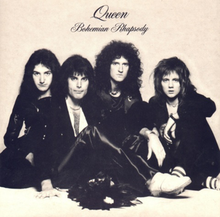
"Bohemian Rhapsody" is a song by the British rock band Queen. It was written by Freddie Mercury for the band's 1975 album A Night at the Opera. The song has no chorus, instead consisting of three main parts: a ballad segment ending with a guitar solo, an operatic passage, and a heavy rock section.
When it was released as a single, "Bohemian Rhapsody" became a huge commercial success, staying at the top of the UK Singles Chart for nine weeks and selling more than a million copies by the end of January 1976. It reached number one again in 1991 for five weeks following Mercury's death, eventually becoming the UK's third best selling single of all time. It topped the charts in several other markets as well, including Canada, Australia, New Zealand, Ireland and The Netherlands. In the United States the song originally peaked at number nine in 1976; however, it returned to the chart at number two in 1992 following its appearance in the film Wayne's World revived its American popularity.
The single was accompanied by a promotional video, considered ground-breaking. Although critical reaction was initially mixed, particularly in the United States, "Bohemian Rhapsody" remains one of Queen's most popular songs. Rolling Stone ranked it as the number 163 on their list of "The 500 Greatest Songs of all time".
History & Recording
Freddie Mercury wrote most of "Bohemian Rhapsody" at his home in Holland Road, Kensington, in west London. The song's producer, Roy Thomas Baker, related how Mercury once played the opening ballad section on the piano for him: "He played the beginning on the piano, then stopped and said, 'And this is where the opera section comes in!' Then we went out to eat dinner." Guitarist Brian May says the band thought that Mercury's blueprint for the song was "intriguing and original, and worthy of work." Much of Queen's material was written in the studio according to May, but this song "was all in Freddie's mind" before they started. Music scholar Sheila Whiteley suggests that "the title draws strongly on contemporary rock ideology, the individualism of the Bohemian artists' world, with Rhapsody affirming the romantic ideals of art & rock. Commenting on bohemianism, Judith Peraino said that "Mercury intended... [this song] to be a 'mock opera,' something outside the norm of rock songs, and it does follow a certain operatic logic: choruses of multi-tracked voices alternate with arialike solos, the emotions are excessive, the plot confusing."
Recording began at Rockfield Studio 1 near Monmouth on 24 August 1975, after a 3-week rehearsal in Herefordshire. During the making of the track, an additional four studios—Roundhouse, SARM (East), Scorpion, and Wessex—were used. According to some band members, Mercury mentally prepared the song beforehand and directed the band throughout. Mercury used a Bechstein "concert grand" piano, which he played in the promotional video and the UK tour. Due to the elaborate nature of the song, it was recorded in various different sections, held together merely by a drum click to keep it in time. May, Mercury, and Taylor sang their vocal parts continually for ten to twelve hours a day. The entire piece took three weeks to record, and in places featured 180 separate overdubs. Since the studios of the time only offered 24-track analogue tape, it was necessary for the three to overdub themselves many times and "bounce" these down to successive sub-mixes. In the end, eighth-generation tapes were used. The various sections of tape containing the desired submixes had to be spliced (cut with razor blades and assembled in the correct sequence using adhesive tape). May recalled placing a tape in front of the light and being able to see through it, as they had been recording so intensely. It was the most expensive single ever made and remains one of the most elaborate recordings in popular music history.
"It's one of those songs which has such a fantasy feel about it. I think people should just listen to it, think about it, and then make up their own minds as to what it says to them... "Bohemian Rhapsody" didn't just come out of thin air. I did a bit of research although it was tongue-in-cheek and mock opera. Why not?"

No comments:
Post a Comment